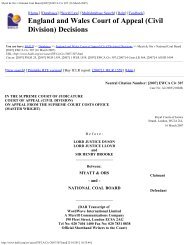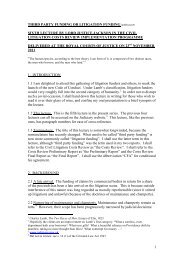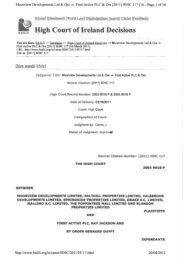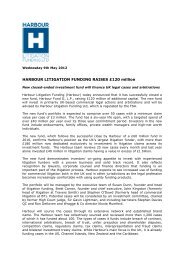[2013] SGHC 135 - Singapore Law Watch
[2013] SGHC 135 - Singapore Law Watch
[2013] SGHC 135 - Singapore Law Watch
You also want an ePaper? Increase the reach of your titles
YUMPU automatically turns print PDFs into web optimized ePapers that Google loves.
<strong>Law</strong> Society of <strong>Singapore</strong> v Kurubalan s/o Manickam Rengaraju [<strong>2013</strong>] <strong>SGHC</strong> <strong>135</strong><br />
champerty. Even if he was not to receive an actual share, but<br />
payment of a commission on a sum proportioned to the<br />
amount recovered — only if he won — it was also regarded as<br />
champerty: see In re Attorneys and Solicitors Act 1870 (1875) 1<br />
Ch.D. 573, 575, per Sir George Jessel M.R. and in Re A<br />
Solicitor, Ex parte <strong>Law</strong> Society [1912] 1 K.B. 302. Even if the<br />
sum was not a proportion of the amount recovered, but a<br />
specific sum or advantage which was to be received if he won<br />
but not if he lost, that too, was unlawful: see Pittman v.<br />
Prudential Deposit Bank Ltd. (1896) 13 T.L.R. 110, per Lord<br />
Esher MR. It mattered not whether the sum to be received was<br />
to be his sole remuneration, or to be an added remuneration<br />
(above his normal fee), in any case it was unlawful if it was to<br />
be paid only if he won, and not if he lost.<br />
42 The traditional rationale was that such arrangements would tempt the<br />
champertous maintainer to subvert the course of justice. As Lord Denning MR<br />
observed In Re Trepca Mines (No 2) [1962] 3 WLR 955 (“Re Trepca Mines”)<br />
at 966:<br />
The reason why the common law condemns champerty is<br />
because of the abuses to which it may give rise. The common<br />
law fears that the champertous maintainer might be tempted,<br />
for his own personal gain, to inflame the damages, to suppress<br />
evidence, or even to suborn witnesses. These fears may be<br />
exaggerated; but, be that so or not, the law for centuries has<br />
declared champerty to be unlawful, and we cannot do<br />
otherwise than enforce the law, and I may observe that it has<br />
received statutory support, in the case of solicitors, in section<br />
65 of the Solicitors Act, 1957.<br />
43 While it may be true that there is less need to be sensitive to the<br />
concern that the “mechanisms of justice” might be vulnerable to the devices of<br />
“unscrupulous men of power” (see [40] above), it remains a fact that a lawyer<br />
who has a personal economic stake in the litigation and is not otherwise being<br />
remunerated for his services faces a potential and often acute conflict of<br />
interest. This was the point made by Lord Denning MR in the passage we<br />
cited from Re Trepca Mines (see [42] above) and it was reiterated by Millett<br />
LJ in Thai Trading (A Firm) v Taylor & Anor [1998] EWCA Civ 370 at [28]<br />
as follows:<br />
24


![[2013] SGHC 135 - Singapore Law Watch](https://img.yumpu.com/37488807/24/500x640/2013-sghc-135-singapore-law-watch.jpg)
![Neutral Citation Number: [2010] EWHC 941 (QB) - Harbour ...](https://img.yumpu.com/47188668/1/190x245/neutral-citation-number-2010-ewhc-941-qb-harbour-.jpg?quality=85)
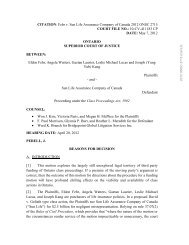
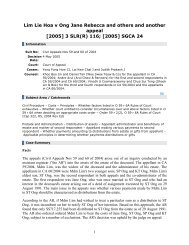
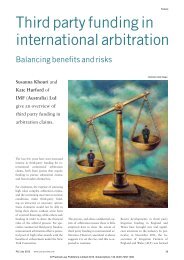
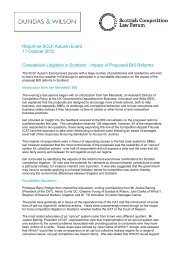
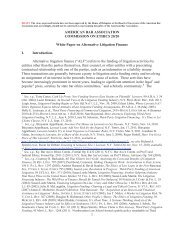

![Hall v Poolman [2009] - Harbour Litigation Funding](https://img.yumpu.com/37488843/1/190x245/hall-v-poolman-2009-harbour-litigation-funding.jpg?quality=85)
